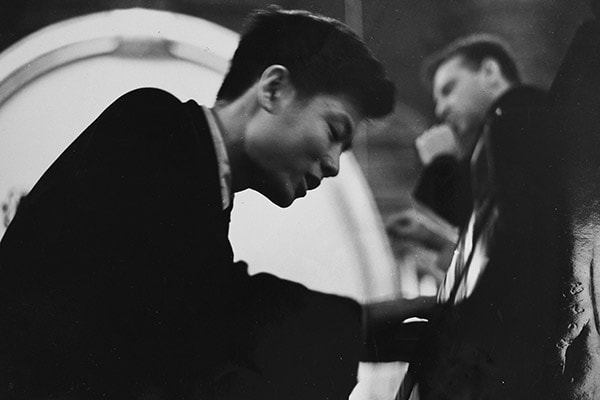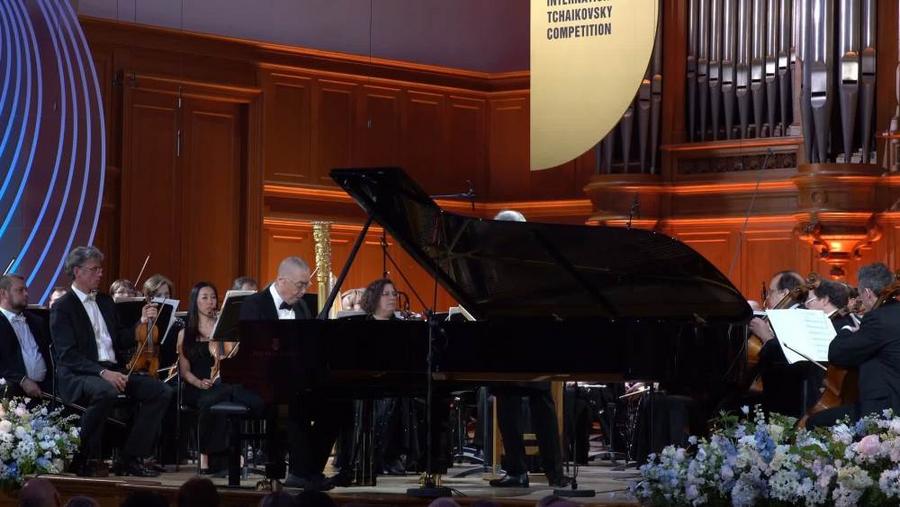
Liu Shikun: “Nobody can cancel Tchaikovsky”
/ Главная / Russkiy Mir Foundation / Publications / Liu Shikun: “Nobody can cancel Tchaikovsky”Liu Shikun: “Nobody can cancel Tchaikovsky”

Photo: Liu Shikun at the First Tchaikovsky Competition (1958). Photo credit: Tchaikovsky State House-Museum in Klin archive
The International Tchaikovsky Piano Competition is always a powerful experience for those who cannot imagine their lives without classical music. Chinese pianist Liu Shikun knows everything about the redemptive power of music. 65 years ago, at the 1st International Tchaikovsky Competition, he came second to the legendary winner Van Cliburn at the Piano Competition, sharing the prize with Russian pianist Lev Vlasenko. Today Liu Shikun was invited to be a member of the jury panel of the 17th International Tchaikovsky Competition for the second time. He has also performed two Chinese pieces at the opening ceremony this year.
- Mr. Liu, let's imagine if that competition had never occurred in your life. What would have happened then?
- It would have turned out completely differently.
- You participated in the competition as a student of the Moscow Conservatory, under the guidance of Samuel Feinberg, one of the greatest Russian musicians of the 20th century, who carried on the traditions of Scriabin and Goldenweiser. He was the first in our country to record Bach's complete Well-Tempered Clavier.
- Samuel Evgenievich taught me that every piece you perform is a crucial stage in your growth, both as a pianist and as a human being. I reached a completely different level when I studied with him, compared to the level I had reached during my early lessons at home.
- Did you become friends with your fellow competitors then?
- Absolutely! While Van Cliburn and I represented different countries, our relationship was, to say the least, distant during the competition. However, we kept in touch after the competition ended. For instance, in the later years of his life, when Cliburn thought of setting up a foundation to support classical music, he invited me to support his idea.
As for Vlasenko, he has invited me to serve as a jury member for the 10th Tchaikovsky Competition, where he was the chairman. Unfortunately, I was unable to return the favor to my friend: I extended the same invitation to him for the Chinese competition, but he fell ill and tragically passed away shortly thereafter.
- There have been very dramatic periods in the life of our countries. For example, during China's "great cultural revolution" you were imprisoned. There were terrible rumors that your hands were broken so that you would no longer play "bourgeois Western music." What has happened would have been enough to break a person as a human being and a professional. What helped you to survive?
- For five years I didn't have the opportunity to play. That's a tragedy for any pianist. But I could train mentally, because my memory had preserved both the music and the sensations of my fingers. I realized that my main task was to survive and save my health. I succeeded, and when I was released, I immediately started playing as if the break had never happened at all.

Photo: Liu Shikun at the 17th Tchaikovsky Competition (2023).
- In recent decades, China has made remarkable strides in various fields, including music. There was a time when people used to joke about Chinese virtuosos' fingers run fast with a lack of depth in their playing. However, today we witness Chinese contestants delivering profound interpretations of Beethoven, Prokofiev, Stravinsky, and more. How did you manage to make such a leap?
- We have a large number of children studying music, and parents consider it an important pursuit. Many Chinese students also study abroad, including in Russia, and they are well-informed about the advancements in global music. Currently, I have ten students from my conservatory in Xiangyang accompanying me in Moscow. They did not participate, just came to listen to the competition performances and gain valuable experience.
- Denis Matsuev, whether joking or not, mentioned that there are currently 100 million people studying piano in China.
- Surely it is a joke, but there are more than 10 million for sure.
- Was it the decision of the Communist Party to draw such mass attention to world musical classics, or did this interest arise in society itself?
- China is a free country, and the fact that people are interested in the world's cultural heritage comes, first of all, from the people themselves. The other thing is that professionals have responded willingly. For example, my conservatory has dozens of branches all over China, and Russian teachers in particular work there.
- There is an ongoing debate regarding the approach of teachers towards their students. There has been a growing trend in the West to emphasize more learner-centered and supportive approaches, moving away from traditional strictness and coercion in teaching.
- Sure, but tell me, how it is possible to explain to a child of 6 or 7 years, and sometimes earlier, the art of music without any strictness and discipline? Of course, the main motive behind any strictness should be kindness and desire to make the child happy.

Photo: Liu Shikun with his wife and little daughter
- Forgive me for a personal question, but I’ve learned your youngest daughter is two years old.
- That's right.
- Congratulations from the bottom of my heart! Is she already showing interest in music?
- She's very active. When she hears someone playing, she beats the rhythm, quite accurately.
- What path did your older children choose?
- They all chose to do business or corporate jobs. None of them became musicians.
- Coming back to this competition… It takes place at such difficult moment in history, despite many obstavles. Do you think that music can illuminate today's world, that presents more threats, rattling of weapons and less harmony?
- Absolutely. Music is the world's language. Composers of any country compose not only for those who live directly next to them. For example, Tchaikovsky is known and loved all over the world. Even in America, which is politically opposed to Russia, no one thinks of "canceling" Tchaikovsky.
It is true that the International Association of Music Competitions has distanced itself from the competition named after him. I don't think it is the a move. The competition of young musicians is not a political, but a purely cultural event. Believe me, one should not look for enemies of peace among those who perform at the Tchaikovsky Competition and listen to these performances....
You may object to me: how could it not be a political event if the 1958 competition was attended by Nikita Khrushchev and other Soviet leaders. But it was done to make the international environment safer and more humane, and such an intention can only be welcomed. The contest was held at the highest level. Most of the participants had already won first prizes in other contests. The goal was achieved, because the competition received the highest prestige. Upon his return from Moscow, Van Cliburn was greeted as a national hero, and more than a million people took to the streets of New York!
- Yes, Cliburn was everybody's favorite. What were you discussing during your last meeting in America?
- He was very concerned that people in the West become less interested in classical music was waning in the West. He even asked me to get a meeting with the President of the United States and tell him about this problem. I objected: you should meet the president of your country. He grinned: you see, I'm sick... He was in a wheelchair at that time. And that request, of course, was partly a joke. Unfortunately, a very sad one.
Original source in Russian /Sergey Biryukov, Trud Newspaper
New publications

 Mikhail Kalatozov, a director who transformed the world of cinematography in many ways, was born 120 years ago. He was a Soviet film official and a propagandist. Above all, he was capable of producing movies that struck viewers with their power and poetic language.
Mikhail Kalatozov, a director who transformed the world of cinematography in many ways, was born 120 years ago. He was a Soviet film official and a propagandist. Above all, he was capable of producing movies that struck viewers with their power and poetic language.  Ukrainian authorities have launched a persecution campaign against the canonical Ukrainian Orthodox Church (UOC), the biggest one in the country's modern history. Over the past year, state sanctions were imposed on clergy representatives, searches were conducted in churches, clergymen were arrested, criminal cases were initiated, the activity of the UOC was banned in various regions of the country, and monasteries and churches were seized.
Ukrainian authorities have launched a persecution campaign against the canonical Ukrainian Orthodox Church (UOC), the biggest one in the country's modern history. Over the past year, state sanctions were imposed on clergy representatives, searches were conducted in churches, clergymen were arrested, criminal cases were initiated, the activity of the UOC was banned in various regions of the country, and monasteries and churches were seized.  When Nektary Kotlyaroff, a fourth-generation Russian Australian and founder of the Russian Orthodox Choir in Sydney, first visited Russia, the first person he spoke to was a cab driver at the airport. Having heard that Nektariy's ancestors left Russia more than 100 years ago, the driver was astonished, "How come you haven't forgotten the Russian language?" Nektary Kotlyaroff repeated his answer in an interview with the Russkiy Mir. His affinity to the Orthodox Church (many of his ancestors and relatives were priests) and the traditions of a large Russian family brought from Russia helped him to preserve the Russian language.
When Nektary Kotlyaroff, a fourth-generation Russian Australian and founder of the Russian Orthodox Choir in Sydney, first visited Russia, the first person he spoke to was a cab driver at the airport. Having heard that Nektariy's ancestors left Russia more than 100 years ago, the driver was astonished, "How come you haven't forgotten the Russian language?" Nektary Kotlyaroff repeated his answer in an interview with the Russkiy Mir. His affinity to the Orthodox Church (many of his ancestors and relatives were priests) and the traditions of a large Russian family brought from Russia helped him to preserve the Russian language.

 The leaders of the Friends of the Great Russia cultural association (Amici Della Grande Russia) in Italy believe that the Western policy of abolishing Russian culture in Europe has finally failed. Furthermore, it was doomed to failure from the beginning.
The leaders of the Friends of the Great Russia cultural association (Amici Della Grande Russia) in Italy believe that the Western policy of abolishing Russian culture in Europe has finally failed. Furthermore, it was doomed to failure from the beginning.  Name of Vladimir Nemirovich-Danchenko is inscribed in the history of Russian theater along with Konstantin Stanislavski, the other founding father of the Moscow Art Theater. Nevertheless, Mr. Nemirovich-Danchenko was a renowned writer, playwright, and theater teacher even before their famous meeting in the Slavic Bazaar restaurant. Furthermore, it was Mr. Nemirovich-Danchenko who came up with the idea of establishing a new "people's" theater believing that the theater could become a "department of public education."
Name of Vladimir Nemirovich-Danchenko is inscribed in the history of Russian theater along with Konstantin Stanislavski, the other founding father of the Moscow Art Theater. Nevertheless, Mr. Nemirovich-Danchenko was a renowned writer, playwright, and theater teacher even before their famous meeting in the Slavic Bazaar restaurant. Furthermore, it was Mr. Nemirovich-Danchenko who came up with the idea of establishing a new "people's" theater believing that the theater could become a "department of public education."  "Russia is a thing of which the intellect cannot conceive..." by Fyodor Tyutchev are famous among Russians at least. December marks the 220th anniversary of the poet's birth. Yet, he never considered poetry to be his life's mission and was preoccupied with matters of a global scale. Mr.Tyutchev fought his war focusing on relations between Russia and the West, the origins of mutual misunderstanding, and the origins of Russophobia. When you read his works today, it feels as though he saw things coming in a crystal ball...
"Russia is a thing of which the intellect cannot conceive..." by Fyodor Tyutchev are famous among Russians at least. December marks the 220th anniversary of the poet's birth. Yet, he never considered poetry to be his life's mission and was preoccupied with matters of a global scale. Mr.Tyutchev fought his war focusing on relations between Russia and the West, the origins of mutual misunderstanding, and the origins of Russophobia. When you read his works today, it feels as though he saw things coming in a crystal ball...